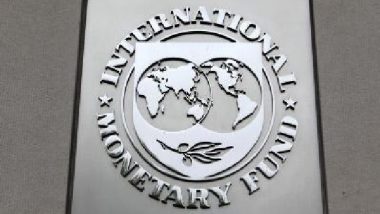Islamabad, April 18: Due to the rising political tension in Pakistan, and also the raging economic crisis, a high-profile Pakistani delegation is likely to make fresh contacts with the International Monetary Fund (IMF) and the World Bank in a meeting at Brent Wood Institutions.
The potential prime minister's advisor on Finance, Miftah Ismail confirmed the participation of the Pakistani team in the BWIs meeting. The official delegation will comprise the finance secretary, State Bank of Pakistan (SBP) governor and additional secretary on external finance. IMF Warns El Salvador From Using Bitcoin As Official Currency.
There is a chance that Ismail also accompanies the delegation after his name is removed from the Exit Control List under the PML-N led federal government, reported Geo News.
Finance Secretary Hamid Yaqoob told The News, "Discussions with the IMF are never halted. There was an interregnum because there was no finance minister. We have been sharing data with the IMF. Now with the spring meeting next week, our discussions have become more regular and focused on completing the 7th Review". However, he did not mention any specific time frame for the completion of the 7th Review under the $6 billion Extended Fund Facility (EFF).
A top government official confirmed that the Ministry of Finance will hold a technical meeting with the IMF this Friday but there is no virtual meeting scheduled for review talks at this point.
Amid a declining economy and political instability, Pakistan has to pay back a foreign debt to the tune of USD 2.5 billion on account of principal and mark-up obligations during the ongoing quarter (April-June) of the current fiscal year 2021-22.
When contacted, renowned economist Yousuf Nazar, who is also the author of a book on Pakistan's economy, said that the POL [petrol, oil and lubricants] prices should be adjusted upward in a staggered or gradual manner. He proposed to adopt a comprehensive approach whereby the unjustified subsidies for big industrialists such as for fertilizer, sugar and other sectors to the tune of Rs1,000 billion per annum should be abolished and diverted towards financing targeted fuel subsidies, reported Geo News.
He also proposed that the fixation of the pricing mechanism of POL products should be made transparent and a parliamentary committee should be formed for allowing a public hearing to ascertain the facts and then transparently place the price fixation mechanism.
The revival of the IMF programme will remain impossible without changing the approach and doing away with the relief mechanism, the report read further. Meanwhile, the government's decision to keep petroleum prices unchanged also sent out wrong signals to the IMF.
In another statement, Dr Khaqan Najeeb, the former adviser at the Ministry of Finance, told Geo News that subsidised energy pricing policies are a heavy burden on the exchequer and thus unsustainable. On the other hand, higher prices driven by the global commodity super-cycle and the effect of rupee adjustment are hard to pass to the consumers already reeling under inflationary pressures.
Dr Khaqan also explained that increasing the breadth and quantum of targeted subsidies is now possible because of new databases developed by the government to cover a larger populace. Other options like fuel cards linked to income support databases, especially for motorcycle users for up to a certain amount at discounted prices and diesel fuel cards for public transporters and agriculturists using tube-wells and tractors can be started. Targeted subsidies will help the government in taking the tough decision of eliminating general subsidies in the economy from which the rich and less privileged are all benefiting, he concluded.
During the week ending on April 1, SBP reserves decreased by USD 728 million to USD 11.3 billion, largely due to debt repayment and government payment pertaining to the settlement of an arbitration award related to a mining project.
In the month of January 2022, the State Bank of Pakistan(SBP) released data showing that Pakistan's Current Account Deficit (CAD) rose to an all-time high of USD 2.56 billion.
As Pakistan's economy continues to plunge with every passing day, the new government led by Prime Minister Shehbaz Sharif has decided to resume talks with the International Monetary Fund (IMF) from Monday. The IMF effectively suspended its programme in the country till the formation of a stable government in the country.
(The above story is verified and authored by ANI staff, ANI is South Asia's leading multimedia news agency with over 100 bureaus in India, South Asia and across the globe. ANI brings the latest news on Politics and Current Affairs in India & around the World, Sports, Health, Fitness, Entertainment, & News. The views appearing in the above post do not reflect the opinions of LatestLY)













 Quickly
Quickly


